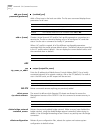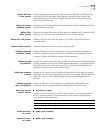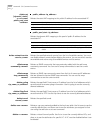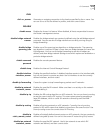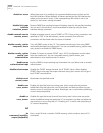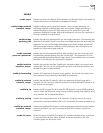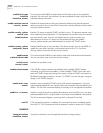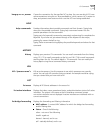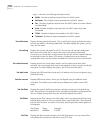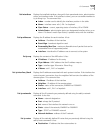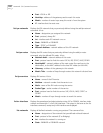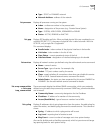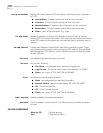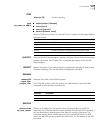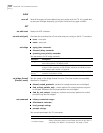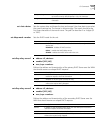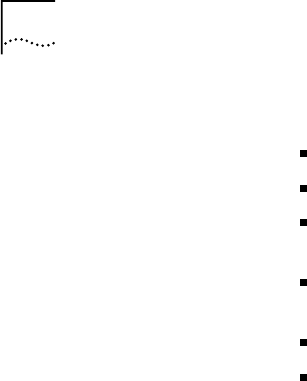
B-18 APPENDIX B: CLI COMMAND DESCRIPTION
mgmt - unknown, but filtering information exists
RxPkt - Number of packets received from this MAC station
RxOctets - No. of bytes (octets) received from this MAC station
Fltr - Number of packets received from this MAC station that were filtered
out (discarded)
Fwd - Number of packets received from this MAC station that were
forwarded
TxPkt - Number of packets forwarded to this MAC station
TxOctets - Number of bytes forwarded to this MAC station
list call events Displays the last twenty call events. This is useful when trying to determine why a
call over the WAN is not being established. The table displays the system, the up
time, and the event.
list call log Displays the current call status for all VCs for which a call has been attempted.
Each entry will include the VC name, the current call state (Disconnected,
Connecting, or Connected), and the reason why the last call was cleared. Reasons
for clearing include: line down, PPP timeout, Authentication error, Network
configuration error, and termination initiated from either the local or remote side.
list critical events Displays the last ten critical status events, and the system time when each
occurred. You can change which events are logged as critical, using the set facility
command. The table displays the system, the up time, and the event.
list dns hosts Displays the DNS Local Host name and its IP address, which you configured using
the add dns host.
list dns servers Displays DNS Name Servers, which you configured using the add dns server
command. The domain name and the server address are listed for each DNS
server.
list facilities Displays the system facilities (processes) currently running, plus the default log
level. The log level is the severity of error that facility will produce syslog entries for.
You can change the log level using the set facility loglevel command.
list filters Displays all the filter names in the filter table, which you previously defined using
the add filter command. You can remove filters using delete filter. The command
lists the filter file name, the status of the filter, and the protocols the file applies to.
For example:
Filter Name Status Protocols
easyfilter.fil NORMAL IP IP-RIP
list files Displays the files currently stored in the FLASH file system. You can remove files
using delete file, but you can add them using TFTP only.



